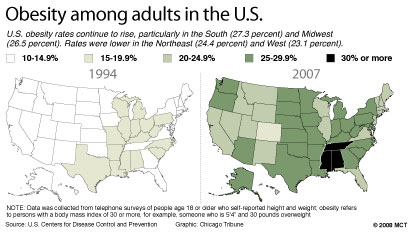 MCT Campus
MCT CampusYour twenties aren’t just tough; they can be downright terrible for your health.
At 20 years old, you are more likely to eat fast food, more likely to binge drink and with the pressure of school and balance of work, stress can take a toll on everything from your inside to your outside.
All of the late nights, bad habits and work overload will eventually add up. One of the most dangerous outcomes though, is when the load can be measured in pounds, which can put you at critical risk for the second leading cause of preventable death in the United States: Obesity.
The American Obesity Association reports, “Obesity is a complex, multi-factorial chronic disease involving environmental (social and cultural), genetic, physiologic, metabolic, behavioral and psychological components.”
While fast-food chains continue to market deals under $5 to maintain sales in the U.S.’s grievous economy, Americans are not only spending their money, they’re gaining weight.
The food choices available to the public cannot be held solely liable for this increase. It is also in large part because of the food choices the people make.
Decisions are made derived from everything from logical reasoning to rash emotion, and obesity, similar to other diseases, has a direct relationship to a person’s emotional state. In the financial turmoil of the times, some people who fear economic stability are allowing their health statistics to shrink down to unstable numbers.
According to AOA, “obesity increases the risk of illness from about 30 serious medical conditions.” An early disease related to obesity includes type 2 diabetes, which can increase in severity to impaired mobility. Obesity can also cause an increased possibility of early death. Moreover, individuals who are overweight or obese typically are discriminated against in social, academic or employment settings.
According to a review of the connection between obesity and depression in Clinical Psychology: Science and Practice, exercise and stress reduction are treatments that when practiced together, can help to manage obesity and depression. Conversely, people who are struggling with their weight should look out for dieting methods and fads that can worsen your mood and alter your attitude as well as medications such as antidepressants that can cause weight gain.
What may be even more disheartening in regard to the epidemic is that according to AOA, “Public health leaders recognize obesity as a “neglected public health problem.'”
Overweight and obesity are part of The U.S. Department of Health and Human Services health agenda; however, the AOA reports that HHS has increasingly “moved away” from improving issues surrounding overweight and obesity problems.
A way to track your health and risk for obesity is to check your body statistics against the Body Mass Index. The BMI measurement is a tool that is used to determine where an individual is on a health spectrum from underweight to obese. On the BMI scale, overweight is defined as a BMI of 25 or more, 30 or more BMI is classified as obese and severe obesity is 40 or more.
Obesity isn’t just a prevalent disease, it’s a poisonous one. It can affect all aspects of your life and lead to serious depression. It is important for people who are concerned about their weight to be properly evaluated by a medical doctor. If you feel that depression is either the cause or result of your weight issues, be sure and communicate your concerns to your doctor so that he or she can work with health care providers to treat both conditions.






